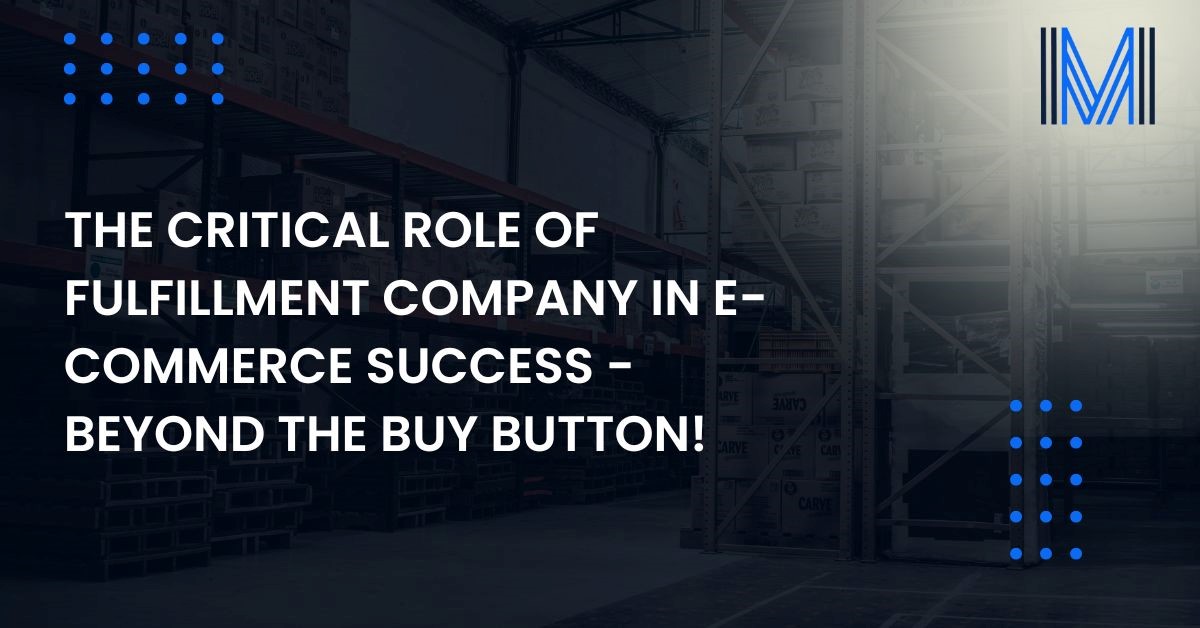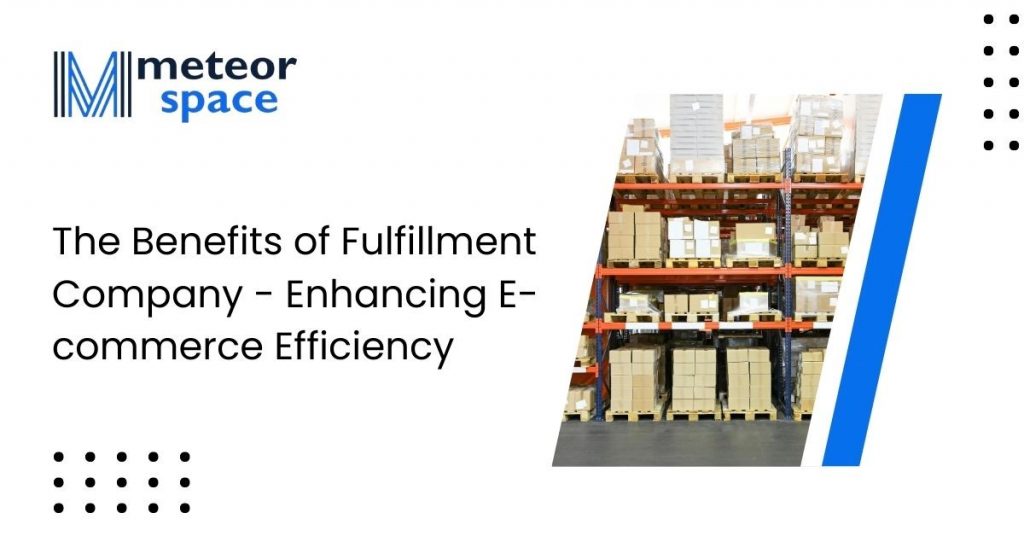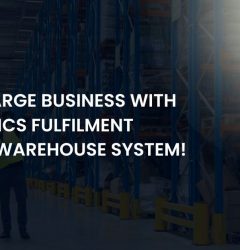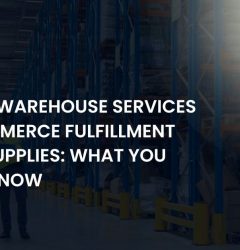05 Jun

The journey from the Buy button to the customer’s doorstep is a critical and intricate process in the ever-changing world of e-commerce. Fulfillment companies are essential in this journey and are frequently invisible to consumers. The fulfillment company makes sure that each time a customer clicks the Buy button, a flawless delivery process occurs. Quite easy, right? So, to make it more understandable and to clarify the important role fulfillment companies play. Let’s delve into the complex procedures and creative solutions that propel e-commerce success as we examine the vital role that fulfillment companies play in the sector in this blog.
Understanding Fulfillment Company:

The unsung heroes of the e-commerce ecosystem are fulfillment companies. From inventory receipts to product shipment to clients, they oversee the entire order processing logistics process. They handle a variety of services, such as shipping pick-and-pack and inventory management.
1. Inventory Management
Any successful e-commerce business is built on effective inventory management. Fulfillment companies track real-time inventory levels through sophisticated warehouse management systems (WMS). This lowers the possibility of stockouts and overstock scenarios by ensuring that e-commerce enterprises can maintain ideal stock levels. Businesses are better equipped to decide on inventory turnover and restocking when they have access to accurate inventory data.
2. Pick and Pack Services
Services like pick and pack are essential to the fulfillment process. Selecting the appropriate products from the warehouse shelves and safely packing them for delivery are included in these services. The fulfillment company uses highly skilled personnel and cutting-edge technology to guarantee precision and effectiveness in this procedure. The intention is to reduce mistakes that could lower customer satisfaction, such as wrong items or damaged goods.
3. Shipping and Delivery
Shipping occurs after the order has been packed. Fulfillment companies collaborate with a network of carriers to offer shipping options that are both economical and timely. Additionally they manage the intricate aspects of shipping internationally such as clearing customs and paying duties. This eliminates the logistical challenges for e-commerce companies and enables them to offer a global reach.
The Evolution of E-commerce Fulfillment

Over time, the function of fulfillment companies has changed dramatically. Product shipping and storage constituted the main focus of fulfillment’s initial simple workflow. Nonetheless, the emergence of online retailers such as Amazon has established new benchmarks for the effectiveness and speed of fulfillment.
Amazon Fulfillment
The industry standard for fulfillment networks is Amazon’s Amazon Fulfillment network. Third-party vendors can store their goods in Amazon’s fulfillment centers through the Fulfillment by Amazon (FBA) program. Amazon picks, packs, and ships items after an order is placed. Thanks to this service, small businesses can now compete with larger players on delivery speed and reliability, which has completely changed the e-commerce landscape.
eBay Fulfillment UK
eBay Fulfillment UK is eBays own fulfillment service that it launched in the UK much like Amazon. With quicker delivery times and higher customer satisfaction this service seeks to expedite the order fulfillment process for eBay sellers. eBay can guarantee prompt and effective delivery of products to customers by utilizing strategically placed fulfillment centers throughout the United Kingdom.
B2B Fulfillment Classifieds
Fulfillment companies also meet business-to-business (B2B) requirements in addition to B2C transactions. B2B fulfillment classifieds entail managing more complicated shipping specifications and bigger inventory volumes. To satisfy the unique requirements of B2B clients, fulfillment companies provide customized solutions that guarantee accurate and timely deliveries to businesses.
The Benefits of Fulfillment Company – Enhancing E-commerce Efficiency

A fulfillment company is a vital strategic partner in the success of an e-commerce business, not just a supplier of logistics services. By outsourcing fulfillment to a specialized organization, e-commerce companies can concentrate on their core skills, like product development and marketing.
1. Cost-effectiveness: It is one of the main advantages of working with a fulfillment company. Because of their large shipment volumes, fulfillment companies can bargain with carriers to lower shipping costs. They can also minimize labor expenses and warehouse space, which they then pass along to their clients.
2. Scalability: During busy times like holidays and sales, e-commerce companies encounter variations in order volumes. Scalability is a feature of fulfillment companies that lets businesses adjust their operations to meet demand. Sustaining service levels and efficiently controlling expenses require this flexibility.
3. Technology Integration: Modern fulfillment companies invest in state-of-the-art equipment to improve efficiency. Order processing and inventory management are made easy by integrating with e-commerce platforms like Shopify and WooCommerce. Businesses can make informed decisions by using real-time tracking and analytics, which offer insightful information about order status and performance variables.
The Fulfillment Process: A Closer Look

Understanding the specific steps that make up the fulfillment process is crucial to understanding the role that fulfillment companies play. Several crucial stages can be distinguished in this process:
Receiving:
When inventory is received from suppliers, the fulfillment process starts. The fulfillment company performs comprehensive inspections to guarantee that the quantity and quality of the received goods match the purchase orders. For precise tracking, the inventory is then entered into the WMS.
Storage
After being received, the inventory is kept in specific areas in the warehouse. Effective storage solutions like pallet racking and shelving make product access easier and maximize space utilization. The WMS assigns every product a unique identifier, making it possible to quickly retrieve it during the picking process.
Picking
The picking procedure begins at the time of order placement. To find and retrieve the requested items, warehouse employees use automated systems or handheld devices. The WMS’s precise instructions on the location and quantity of each item ensure accuracy.
Packing
After being picked, the products are taken to the packing station. To avoid breakage during transportation, the goods are packaged here safely and with the right materials. To improve the unboxing experience for customers, extras like custom inserts or promotional materials may be added during the packing process.
Delivery
After being packed, the orders are prepared for shipping. The fulfillment company produces shipping labels and other delivery-related paperwork. They work with carriers to arrange for prompt delivery and pickup. Clients are given tracking information so they can keep an eye on the progress of their orders.
Returns Management
The fulfillment business is essential to managing returns, which are an unavoidable aspect of online shopping. They receive returned goods, inspect them, and arrange for any necessary exchanges or refunds. Effective returns management facilitates maintaining client loyalty and satisfaction.
The Wrap:
Now, it is clear that fulfillment companies play a crucial role in the success of every online order in the ever-changing world of e-commerce. They handle every aspect of inventory management and shipping to ensure a smooth delivery. By collaborating with fulfillment companies, e-commerce companies can concentrate on expansion and innovation, as they can trust them to handle their logistics expertly.
Also, you can check out Meteor Space, a platform that provides strong warehouse management and e-commerce fulfillment services. With Meteor Space, there has never been a more seamless experience from the Buy button to the doorstep. So, visit us today!
Author:
Namrata Chawla
Namrata Chawla, a professional writer, crafts compelling weblog content on warehouse management, inventory control, logistics, and beyond. With a wealth of experience in this niche, she’s dedicated to delivering unique, informative, and top-tier posts. Her commitment to exploration ensures fresh perspectives in each insightful blog post.
UPDATED ON: 5th June 2024



